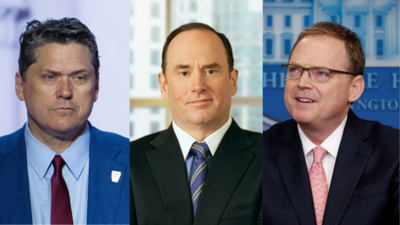
US President-elect Donald Trump made several major announcements on Tuesday night, unveiling his picks for key positions within his administration. Among them, Trump has selected businessman John Phelan to lead the US Navy, economist Kevin Hassett to chair the National Economic Council, and speechwriter Vince Haley to head the Domestic Policy Council. These appointments will take effect when Trump assumes office as President on January 20.
John Phelan
Trump nominated John Phelan as the next Secretary of the Navy. Phelan, who has no prior military experience, is best known for leading the private investment firm Rugger Management and for his role in managing Michael Dell’s investments. Despite his lack of military background, Trump expressed confidence in Phelan’s ability to lead the Navy. “It is my great honour to announce John Phelan as our next United States Secretary of the Navy! John will be a tremendous force for our Naval Servicemembers and a steadfast leader in advancing my America First vision,” Trump posted on his Truth social account.
Trump’s choice of Phelan follows his earlier appointment of Army National Guard veteran Pete Hegseth as secretary of defence. Phelan, a significant donor to Trump’s campaign, hosted the president-elect at his Aspen home this summer, where they discussed issues like immigration. Trump’s selection of Phelan follows a series of interviews at Mar-a-Lago, and while other military veterans were rumoured for the role, it appears that Phelan’s leadership qualities stood out.
Kevin Hassett
Kevin Hassett, a seasoned economist with a long history of advising Republican leaders, has been appointed to lead the National Economic Council (NEC). Hassett previously served as Chair of the White House Council of Economic Advisers (CEA) from 2017 to 2019, a position that put him at the centre of Trump’s economic policy. Trump praised Hassett’s intelligence and experience, saying, “Kevin has a brilliant mind for economics and will continue to drive forward the policies that have made our economy stronger.”
Hassett is currently a managing director at the Milken Institute and a distinguished fellow at the Hoover Institution at Stanford University. His prior work includes advising several Republican presidential campaigns, including those of John McCain, George W. Bush, and Mitt Romney. Hassett’s return to the administration comes with the promise of a focus on tackling long-term unemployment and crafting economic policies that benefit the American people.
Vince Haley
Vince Haley, a key speechwriter during Trump’s first term, has been tapped to lead the Domestic Policy Council (DPC), which plays a central role in developing and implementing the president’s domestic policies. In an announcement on TruthSocial, Trump praised Haley’s intellect and policy expertise, saying, “Vince will help make life better for ALL Americans, and unify our Country through SUCCESS.” As Director of the DPC, Haley will oversee the development of policies aimed at curbing inflation, securing the southern border, and developing economic growth.
Haley, an attorney by training, has a close relationship with Trump’s senior advisor Stephen Miller, whom Trump appointed to serve as deputy chief of staff for policy. Haley’s longstanding ties with former House Speaker Newt Gingrich also set him apart as an influential figure within conservative circles. His role in the first term’s speechwriting department and his work on key policy issues have earned him recognition as a sharp policy strategist.
Vision for Trump’s second term
With figures like Phelan, Hassett, and Haley, Trump aims to reinforce his America First agenda and steer the US Navy, economic policy, and domestic issues in a direction that he believes will benefit the American people. These selections also indicate Trump’s intention to rely on trusted allies with strong policy backgrounds, while keeping his focus on disruptors and non-traditional leaders to challenge the status quo.